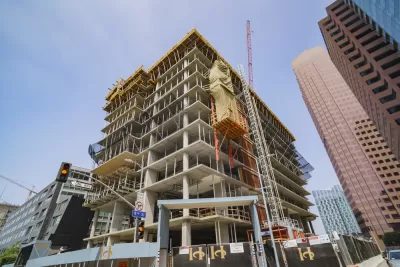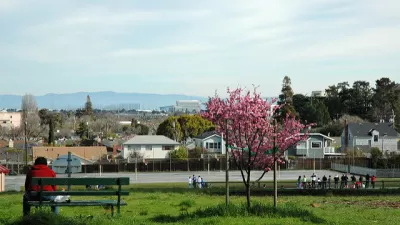The California Renters Legal Advocacy and Education Fund, unlike other renters groups, sees increased housing production as key to bringing down rents. It is enforcing the Housing Accountability Act in cities that arbitrarily deny new construction.

Last year, a property owner submitted plans for a 10-unit, 4-story condominium in the city of San Mateo along the county's busiest and most frequent transit line, the ECR, named for El Camino Real, aka State Route 82, that runs through the entire county, connecting to San Francisco in the north and San Jose to the south. [See SamTrans map and schedule. The site is also adjacent to a bus stop on the busy route.
Nearby single-family homeowners objected, even though the property at 4 West Santa Inez Avenue is zoned multi-family residential, neighbors objected, claiming it was out-of-character and would stress the parking supply. The city council caved to their objections, voting "3-1 to deny the applicant’s appeal of the commission’s fall decision, with Mayor Rick Bonilla voting against the denial," reported Anna Schuessler for the San Mateo Daily Journal on Feb 7, 2018.
Though San Mateo residents raised questions about how a 10-unit condominium project proposed for El Camino Real would fit within its surrounding neighborhood and affect traffic, the City Council’s decision to uphold the Planning Commission’s denial of the project [Feb. 5] ultimately came down to distance between a one-story home adjacent to the property and the four-story building included in the plans.
Similar housing outcomes play out throughout coastal California, particularly in affluent cities with active citizenry intent on preserving what is often called "neighborhood character or charm" in spite of a dire need for more housing. However, these denials of multi-family housing on appropriately zoned land may also be a violation of housing law.
On April 26, the California Renters Legal Advocacy and Education Fund (CaRLA) "filed a lawsuit against the City of San Mateo, alleging that the city violated the state’s Housing Accountability Act with an unlawful denial of a housing project," writes
The City of Sausalito denied the project on the grounds that the project is “out of scale with the village like quality of Sausalito”. We alleged that the city’s reason for denial of the project was based on subjective criteria, which is a violation of the Housing Accountability Act’s requirement that projects can only be denied for objective, legally-defined criteria; the organization prevailed as the city saw no alternative but to settle.
Ten units in San Mateo, one in Sausalito, and three in Berkeley won't affect the state's housing crisis, but the lawsuits send a message to city councils reluctant to add density to single-family neighborhoods. And there are financial consequences, adds Fierce on the Sausalito settlement:
We’ve recouped attorneys’ fees as part of the settlement, putting other cities on notice that there are material consequences to violating state housing law. As CaRLA continues to enforce state housing law, cities across the state are beginning to see the writing on the wall and opting to avoid lengthy trials by reversing these unlawful denials early on, further expediting much needed additions to the state’s housing supply.
The Housing Accountability Act, also known as the anti-NIMBY law, was strengthened last year with the passage of SB 167, authored by Sen. Nancy Skinner (D-Berkeley). It was co-sponsored by CaRLA and the California Apartment Association and opposed by the California Chapter of the American Planning Association.
CaRLA, a 501(c)(3) organization, acts as the legal advocacy arm of the YIMBY Party.
Alternative perspective
For an alternative perspective on CaRLA, SB 167 and AB 1515 by Assemblymember Tom Daly (D-Anaheim), which also strengthens the Housing Accountability Act, read "Little-known Yimby-developer bills will have big impact on local planning," in 48 Hills, "San Francisco and the Bay Area’s independent, progressive news and culture site, by Zelda Bronstein.
FULL STORY: The City of San Mateo denied housing. Today, we filed suit.

Study: Maui’s Plan to Convert Vacation Rentals to Long-Term Housing Could Cause Nearly $1 Billion Economic Loss
The plan would reduce visitor accommodation by 25,% resulting in 1,900 jobs lost.

North Texas Transit Leaders Tout Benefits of TOD for Growing Region
At a summit focused on transit-oriented development, policymakers discussed how North Texas’ expanded light rail system can serve as a tool for economic growth.

Why Should We Subsidize Public Transportation?
Many public transit agencies face financial stress due to rising costs, declining fare revenue, and declining subsidies. Transit advocates must provide a strong business case for increasing public transit funding.

How to Make US Trains Faster
Changes to boarding platforms and a switch to electric trains could improve U.S. passenger rail service without the added cost of high-speed rail.

Columbia’s Revitalized ‘Loop’ Is a Hub for Local Entrepreneurs
A focus on small businesses is helping a commercial corridor in Columbia, Missouri thrive.

Invasive Insect Threatens Minnesota’s Ash Forests
The Emerald Ash Borer is a rapidly spreading invasive pest threatening Minnesota’s ash trees, and homeowners are encouraged to plant diverse replacement species, avoid moving ash firewood, and monitor for signs of infestation.
Urban Design for Planners 1: Software Tools
This six-course series explores essential urban design concepts using open source software and equips planners with the tools they need to participate fully in the urban design process.
Planning for Universal Design
Learn the tools for implementing Universal Design in planning regulations.
City of Santa Clarita
Ascent Environmental
Institute for Housing and Urban Development Studies (IHS)
City of Grandview
Harvard GSD Executive Education
Toledo-Lucas County Plan Commissions
Salt Lake City
NYU Wagner Graduate School of Public Service





























